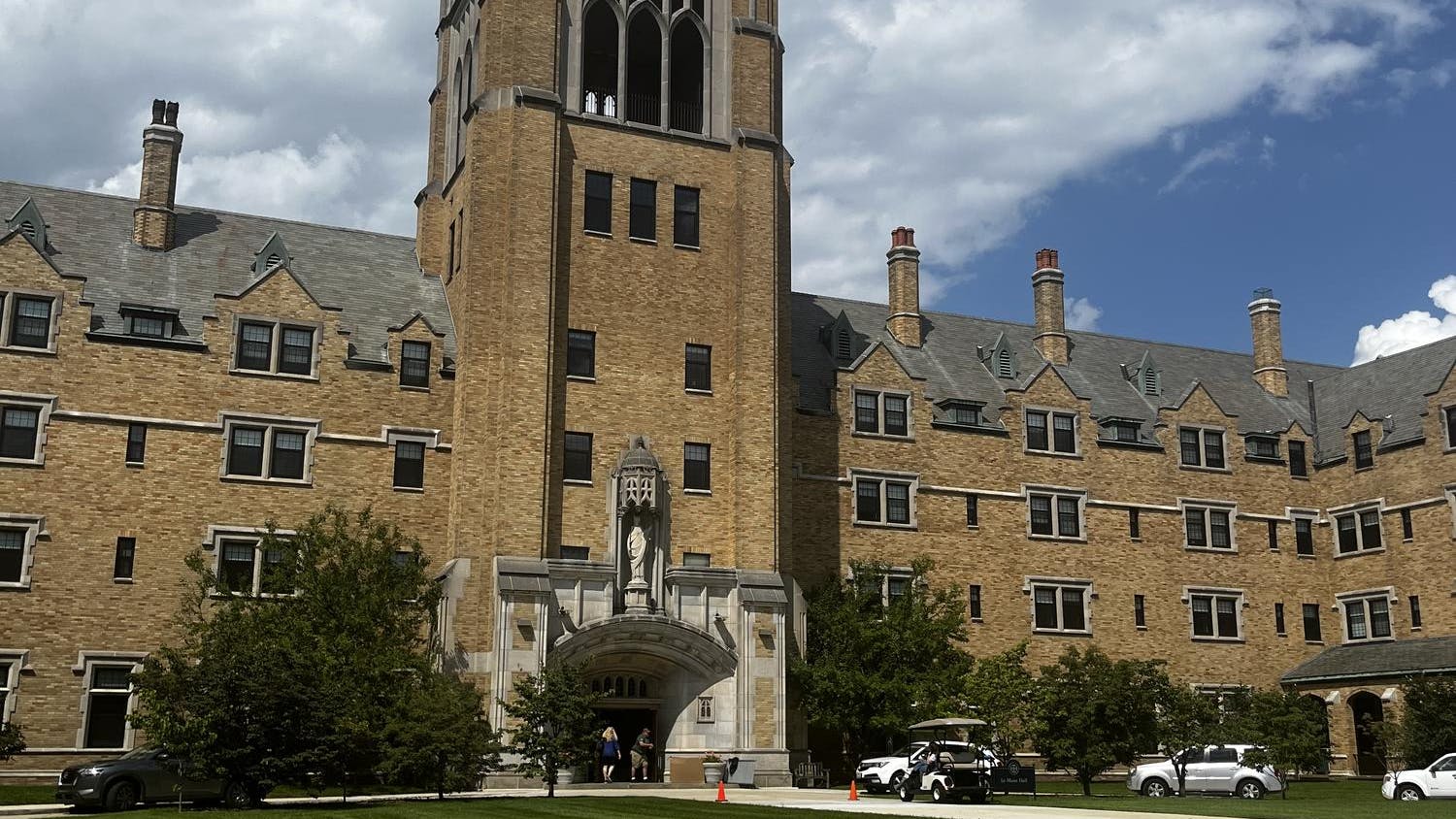The University announced in fall 2017 that — beginning with the class of 2022 – students would be required to live on campus for six semesters. As part of this statement, the Office of Residential Life also said they would be brainstorming incentives for Notre Dame students to stay on campus for their senior year.
Now, the Division of Student Affairs released a finalized list of the updates in a statement first disclosed almost a year and a half ago. Erin Hoffmann Harding, vice president for student affairs, said the University approached their changes to residential life from three distinct perspectives.
“I view this communication as a bookend to that original announcement,” Hoffmann Harding said. “Now having listened to students really for the past year and a half ... we came up with these three groups, which [include] something specifically for seniors that would attract them back to campus, some things that we hope will benefit all students in very tangible [ways] and, thirdly, really thinking about the quality of hall life and how we can make that residential experience while students are a part of it — whatever year they are — as meaningful as possible.”
One of the incentives aimed towards seniors is the implementation of a senior leadership program in addition to the pre-existing resident assistants, associate vice president for residential life Heather Rakoczy Russell said.
“We wanted to consider what other leadership opportunities might be possible, both to further develop our students but also to attract back some rising seniors who we might otherwise have lost to off campus,” Russell said.
Students who are selected for the leadership position, known as “Senior Fellows,” will receive a compensation package of $3,000 per year. Russell said the positions will allow seniors to lead both inside the residence hall and in the Notre Dame community at large.
“One of those roles will be hall-based, and it will be unique to each residence hall since they are so unique,” Russell said. “The other leadership roles will be really grounded in various departments — whether it’s wellness or in student development, diversity and inclusion, internationalization, GreeNDot — so that there would be opportunities for students who want to serve in a more specialized way to be trained really as those fellows. ... We hope those leaders would be chosen by the department in consultation with the rectors so that their citizenship both in the residence hall and at the University would be taken into consideration.”
Another program intended to incentivize students to stay on campus is a $2,000 credit for students who commit to live on campus for their senior year as sophomores. The credit is limited to the first 250 applicants, and any student who does not follow through with their commitment will be fined $1,000, according to the release.
Hoffmann Harding said the University hopes this will increase the presence of seniors in the hall community.
“Our real hope there is to actually be part of that conversation we know students are having early in their sophomore year,” Hoffmann Harding said. “Really having received some marketing materials off campus, we simply want to name and let students know how much we value senior leadership in the hall. … We think it’s a really important time for students to know how much the residence halls and the University more broadly really values the presence of seniors.”
In addition to incentives for seniors to live on campus, the Office of Residential Life also plans to introduce a number of updates to the Notre Dame dorm experience. One of these includes a commitment to update meal plans, Hoffmann Harding said.
“Perhaps the single most significant thing that students said to us in feedback leading up to our initial announcement, and then talking about incentives, is how much of a difference more flexibility in the meal plan would make for their decision to live on or off campus,” Hoffmann Harding said. “Students really enjoy and love the dining options on campus, but like anything after you’ve been experiencing it for three and then four years, it might not have as much newness and novelty to it.”
In conjunction with the meal plan updates, the University also plans to offer more full kitchens in new and renovated residence halls, allowing students and seniors specifically to explore cooking for themselves. The plan has typically been to include a full kitchen as well as food sales in new and renovated men’s dorms and a full kitchen on each floor in women’s dorms. However, Russell said Baumer Hall will include two full kitchens in addition to food sales.
Russell said creating these communal spaces in new and renovated dorms is a priority, even if it means decreasing the number of beds open in a given dorm.
“In the historic halls where we’ve done major renovations, we have followed that plan and been met with very positive reception,” she said. “Maybe the common spaces are different than they were before, but there seems to be a nice balance of quiet study, and group study, and gathering space and cooking space, and so it’s not at the detriment to something else. Usually what we’re losing in order to be able to do that is capacity, so we’re uncrowding residence halls in order to create better common space for students to gather and create community.”
Another change is the elimination of coin laundry fees, making laundry free in residence halls across campus. The Office of Residential Life said in the press release that this change is the result of efforts by student government and awareness of the financial aspects of laundry.
“Students have expressed discontent with the costs associated with residence hall-based laundry machines, and student government recently addressed this issue with the Board of Trustees,” the release said. “These costs disproportionately add a financial burden to students with greater financial need.”
In addition, students who wish to live in a single room will no longer have to pay the $500 fee associated with living in a single. Russell said no longer charging for singles will further equate dorm experiences, as some halls simply offer more single rooms.
“The up charge for singles is the only differentiated room cost that we have,” she said. “And what we have been mindful of in Residential Life is that there are some halls just by virtue of their construction that have an inordinate amount of singles, and sometimes what happens is that the students that end up with a single are not those who would have chosen a single but who find themselves at the end of room picks and those are the rooms that are still available. That seems like first and foremost an inequity in terms of them choosing those rooms … to the extent that it was something that was a detractor from the decision to remain on campus, better to eliminate it.”
The University is also trying to standardize enforcement of parietals and alcohol procedures across all residence halls. The University will also work to widen the difference between on and off campus living experiences, the release said.
“In the coming year, together with its partners in the Division of Student Affairs and across the University, the Office of Residential Life will draw clearer distinctions between residents of hall communities and those who opt to move out of them,” the release said. “Students who choose to leave will no longer enjoy all of the rights and privileges of residents (e.g., including participation on hall sports teams and presence at hall dances).”
Russell said the goal behind this initiative is to make living within residence hall communities as special as possible for the residents.
“What I’ve worried about over time is that if we say intentionally or unintentionally to our students, ‘When you move off campus, you can still continue to come to dances and community events and participate in hall sports and other things,’ then it doesn’t differentiate what that experience was when they were a member of the on campus community versus the off campus community,” Russell said. “So I think the right message to send our students, in fact, to prepare them for the real world, is for them to receive the message that there are rights and privileges that come with any community of which you’re a part, and both are good — they’re just different.”
Hoffmann Harding said the goal of these policy updates is to make hall life a positive experience for all members of the Notre Dame community.
“If we really do our jobs right and have listened carefully to students as we’ve tried to do, we want to attract students to stay with us during that last year,” Hoffmann Harding said. “But we’re worried about the experience of all students. We’re excited about some of these changes to try to be responsive to making hall life better. We think hall life matters, and the University wants to invest in that experience.”













